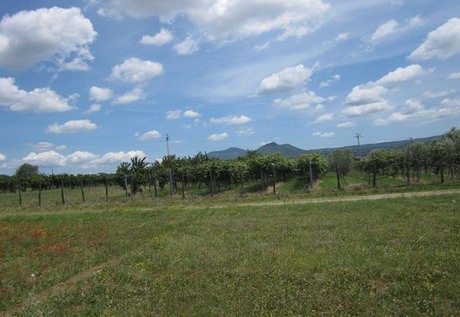Prof. Eddo Rugini of the University of Tuscia (Viterbo - Italy), chief researcher in the GMO studies, clarifies: "Unlike what is written within the letter of protest, we always worked carefully respecting all the official security guidelines".

The experimental field by the University of Tuscia (Viterbo - Italy).
As the researcher explains: "The cherry trees in our experimental field are not transgenic; only the rootstocks are GMO's and they are completely sterile. This means that no pollen is produced by them, so that they do not need to be covered (in order to isolate them from the environment). The transgenic olive trees - modified to allow a better resistance against the diseases and to reduce their height - never produced a single flower".
"The only transgenic plants which can produce pollen are some male kiwi plants. Every year we eliminate all their flowers before they open. Female kiwi plants do not produce pollen and they are artificially pollinated with some control plants. The resulting fruits are analysed in our facilities, in order to verify their resistance against fungal diseases, then they are destroyed".
A request without answer
Some of the first results of this research appeared interesting (better resistance against plant diseases, water stresses and cold weather conditions); on the other hand, the lack of financial resources and the occurring of some adverse factors (for example, the absence of blossoming on the olive trees), forced the researchers to ask for more time. Neither the local nor the national Italian authorities ever answered.
"They never answered to us, but now they hurry up to give an answer to the anti-OGM activists, by imposing a complete eradication of the experimental field. A huge waste of public money and a lost battle for everyone".
According to Prof. Rugini, the experimental field could be a way to find out if and in which measure transgenic plants can or cannot "pollute" an environment, as alleged by anti-OGM activists.
Furthermore - as Rugini underlines - only public research can provide wider knowledge about plants and food which could be introduced in the future (if not being already introduced!) and about which, due to the suspension of the research activities, people are not going to be better informed about neither able to recognize it.
The Italian scientific community considers the order to destroy the experimental field as "something not worthy of a country which should show being able to reflect and make informed decisions, far from ideological positions. The public authorities, on the contrary, fearing their own shadows, are impeding collectiion of the data, i.e. the scientific ones, which can only allow the clarification each other's positions in matter of GMO's".










